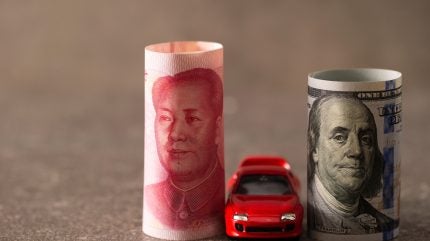
US toy retailers are facing mounting challenges as the trade tariffs imposed by former President Donald Trump continue to squeeze margins and complicate sourcing strategies.
With nearly 80% of toys sold in the United States produced in China, many businesses are reporting delayed shipments, rising costs and even legal action—all as hopes hinge on the expiry of a temporary tariff pause in early July.

Discover B2B Marketing That Performs
Combine business intelligence and editorial excellence to reach engaged professionals across 36 leading media platforms.
Tariff stacking inflates import costs
Retailers are contending with a web of overlapping tariffs on Chinese imports, where duty rates now stack as high as 145% in some cases—far above the 30% headline figure quoted by officials.
Smaller toy importers are disproportionately affected, with many forced to increase prices or eat some of the added costs to stay afloat. Alignable reports that over 57% of small retailers expect revenue losses due to this uncertainty.
Disrupted supply chains and reduced stock
The combination of high tariffs and shifting trade policy has caused substantial supply chain delays.
Companies such as Basic Fun! rushed to forward-ship container loads while the tariffs were temporarily reduced from 145% to 30%—an effort that offered short-term relief but failed to eliminate ongoing uncertainty.

US Tariffs are shifting - will you react or anticipate?
Don’t let policy changes catch you off guard. Stay proactive with real-time data and expert analysis.
By GlobalDataMultiple firms have also started cutting orders or narrowing their product lines in anticipation of possible disruptions, especially during crucial retail periods like the lead-up to Christmas.
Legal battles and strategic sourcing shifts
Several toymakers have taken legal action against the administration. Learning Resources, an Illinois-based educational toy producer with around 500 employees, has sued the federal government, arguing Trump exceeded his authority under IEEPA in imposing steep tariffs.
St Paul’s Mischief Toy Store has joined similar litigation claiming the 145% levy is unconstitutional.
These challenges follow broader legal rulings, such as a Federal Trade Court decision in late May blocking the so-called “Liberation Day” tariffs under IEEPA—though that ruling remains stayed during appeal.
Meanwhile, larger toy manufacturers are proactively shifting production to countries like Vietnam, India and Indonesia.
Major brands such as Mattel, Hasbro and MGA Entertainment have accelerated their transition away from China—MGA, for instance, plans to boost output from alternate sites from around 15% to 40% in the next six months.
Looming tariff deadline and market consequences
The current 90-day tariff reduction is set to expire in early July, re-establishing uncertainty for importers who must rapidly adapt or lock in alternative supply chains.
Analysts warn that sustained high duties may lead to permanent business closures in the SME sector, reduced innovation capacity and higher prices at the checkout for consumers—especially families with school-age children.
With courts mulling the legality of the tariffs and retailers racing to diversify their sourcing, the US toy industry remains on edge.
Any extension or change in tariff policy could determine whether small toymakers and independent stores survive the current economic squeeze—or succumb to rising costs and regulatory complexity.Navigate the shifting tariff landscape with real-time data and market-leading analysis. Request a free demo for GlobalData’s Strategic Intelligence here.





